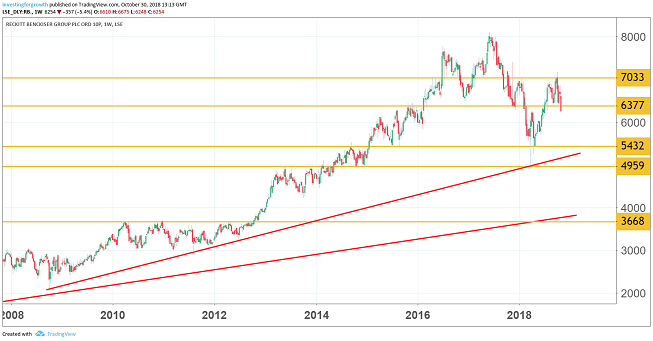Reckitt Benckiser's premium status under threat
30th October 2018 13:24
by Graeme Evans from interactive investor
It's typically one of the more resilient blue-chips around when times are tough, but Reckitt is bottom of the FTSE 100 right now. Graeme Evans explains why.

The premium status afforded to shares in Reckitt Benckiser was called into question today after more one-off issues at the FTSE 100-listed health and household products group.
The latest blow to confidence stems from the recently acquired Mead Johnson baby formula business, where third-quarter like-for-like sales fell 6% due to temporary manufacturing disruption at a European plant.
This meant Cillit Bang, Harpic and Durex owner Reckitt posted overall underlying sales growth of 2%, compared with the consensus of 4% that was based on the open goal of soft comparatives a year ago.
As well as the 2017 disruption caused by a cyber attack and a disappointing product launch for its Scholl footwear brand, Reckitt has also posted poorly-received trading updates in February and April this year.
UBS analysts are unimpressed and believe this latest performance will test investors' patience. They added: "We think the stock is unlikely to stay at its premium multiple in the near-term despite the "temporary" nature of the problem."
Based on a price earnings (PE) multiple of 19x for 2019, they note that Reckitt has been trading at a 5% premium to the EU staples sector. UBS thinks that the Reckitt valuation is full, resulting in its price target of 6,400p prior to today.
Analysts at Exane BNP Paribas have a price target of 6,800p, adding that "charity may be in short supply" after the recent problems and the fact that sales comparisons will toughen in the current quarter.

Source: TradingView one-week chart (*) Past performance is not a guide to future performance
The other view, of course, is that this stumble from Reckitt will present investors with an attractive opportunity to buy a well-regarded stock that has still managed to outperform the FTSE 100 over the past year.
The Slough-based company sells products that most consumers can't do without, so shares have the potential to offer some protection in uncertain times.
Bank of America Merrill Lynch analyst Guillaume Delmas remains a supporter, having reiterated his 'buy' recommendation and price target of 8,000p.
He said the Mead Johnson difficulties masked strong progress in the core business, with the fact that Reckitt is sticking by 2018 targets suggesting a pick-up in like-for-like sales growth in Q4 to 3%-4%.
The Health and Hygiene Home businesses each delivered 4% like-for-like growth in the third quarter, despite a backdrop of mixed market conditions. CEO Rakesh Kapoor said this demonstrated brand strength, as well as innovation success and the impact of recent restructuring into two core divisions.
He added: "Although encouraging, we remain focused on further improving our growth trajectory."
The disruption at the European infant nutrition plant has now been resolved, although Reckitt expects some residual impact in this quarter and into 2019.
The problems, which affected sales to a number of markets in a period of unusually high growth, happened before Reckitt could diversify its supply chain with the opening of a new plant in Australia.
Given its focus on integrating the Mead Johnson business it acquired for $18 billion in 2017, Reckitt pulled out of the running to buy Pfizer's consumer healthcare division earlier this year.
*Horizontal lines on charts represent levels of previous technical support and resistance. Red lines represents uptrend from 2000 and then 2008.
These articles are provided for information purposes only. Occasionally, an opinion about whether to buy or sell a specific investment may be provided by third parties. The content is not intended to be a personal recommendation to buy or sell any financial instrument or product, or to adopt any investment strategy as it is not provided based on an assessment of your investing knowledge and experience, your financial situation or your investment objectives. The value of your investments, and the income derived from them, may go down as well as up. You may not get back all the money that you invest. The investments referred to in this article may not be suitable for all investors, and if in doubt, an investor should seek advice from a qualified investment adviser.
Full performance can be found on the company or index summary page on the interactive investor website. Simply click on the company's or index name highlighted in the article.